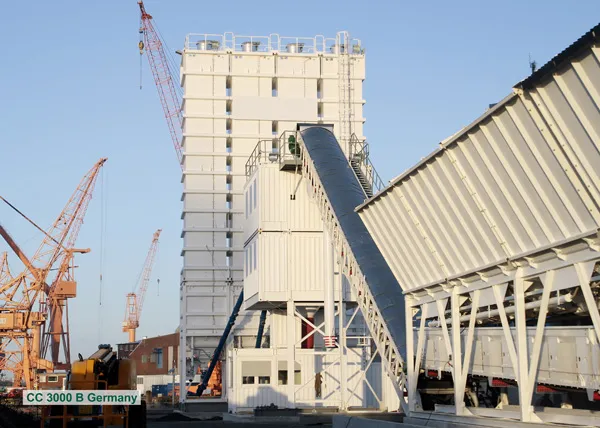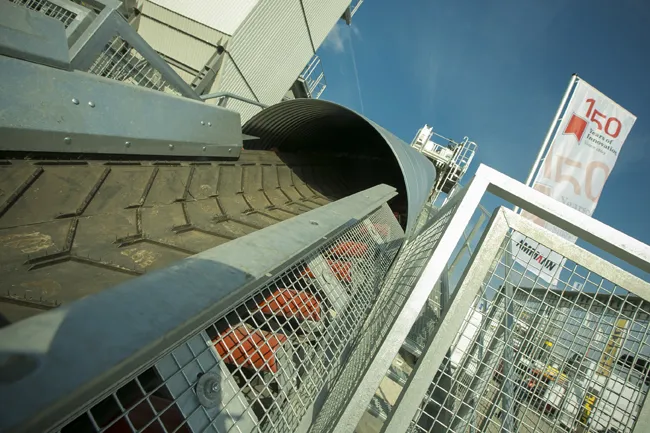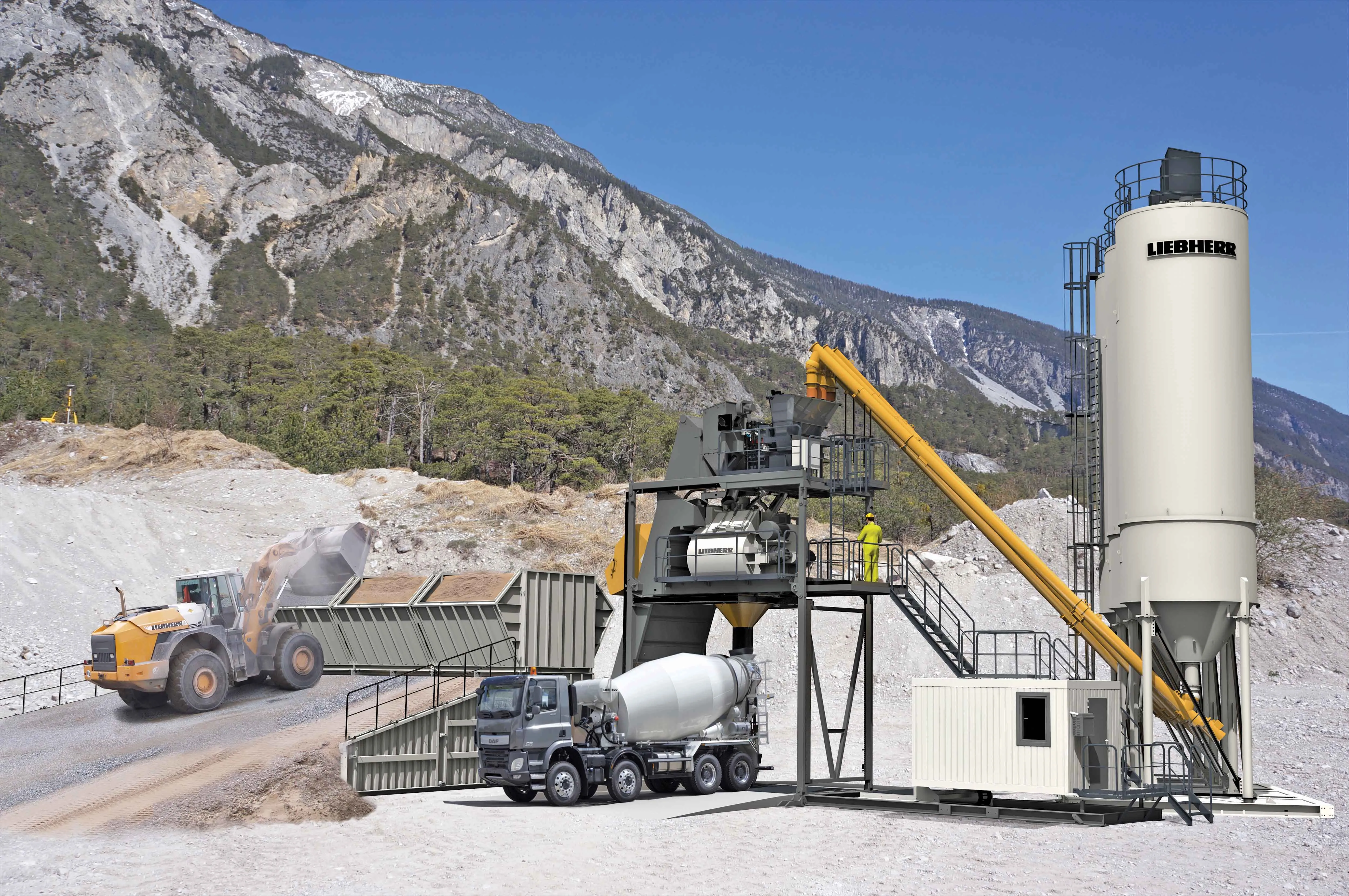Innovative plants are coming to the market to produce various types of concrete including new mixes as Patrick Smith reports
February 24, 2012
Read time: 6 mins

Innovative plants are coming to the market to produce various types of concrete including new mixes as Patrick Smith reports
"High-precision measuring equipment and comprehensive process control guarantee perfect results. Ammann's plant control system as1 leaves nothing to be desired with regard to operator friendliness and extendibility and enables the efficient and rational production of concrete," says Ammann.
The EcoMix's galvanised lightweight and warp-resistant steel supporting structure is also suitable for areas with enhanced seismic activity.
The EcoModule, equipped with the Amix twin-shaft paddle mixer, is pre-assembled and tested at the factory. Its optional climate control is energy-efficient and makes the plant suitable for any climate zone.
"The EcoMix needs little space and is also suitable for urban areas thanks to its low emissions," says Ammann.
Italian manufacturer
"Thanks to these inventions, the concrete batching plants MMX4000 can ensure an hourly output capacity of 100m³ of high quality concrete," says SIMEM.
The plant is also said to offer easy transport and installation, absence of civil works, easy maintenance and environmental protection, along with minimal installation time and cost (it can be operated by one person).
Significant projects Spanish manufacturer,
"We put all our energy into offering our customers the latest technology in machinery related to the concrete industry. With this aim, we provide a wide range of products in the sector," says the company.
It now offers a variety of different models including concrete plants, prefabricated concrete manufacturing plants, mortar manufacturing plants and storage silos.
It says its mobile plants are designed for the demands of every construction site, and are highly flexible.
"All the models are conceived and designed to solve the different problems that may arise regarding the siting needs of a mobile plant on-site. These models include a design conceived to locate the plant in very small spaces; the utmost simplicity of transport, and versatility to adapt the plant for expansion in storage, silos or wet chutes such as on the ECA-1000, EMA-2000 or COWETE." Frumecar says it also has a wide variety of stationary batching plant models with many possibilities to adapt them to meet a customer's needs. It also designs, manufactures and installs mortar plants as well as producing plants specially designed to elaborate and dose concrete to produce precast elements such as tubes, pavements, kerbs, blocks and beams.
With the need to get a precise and exact mix, and a uniform and homogeneous mix to get the same quality in each batch, the mixer is one of the most important elements in this type of batching plant, says Frumecar.
"We are also producing concrete recycling systems to protect the environment and its ecological surroundings. The only way to recover 100% of the excess concrete from trucks is to create a closed circuit of the material used in making the concrete." For this, Frumecar offers its ECONIC-15, ECOTROM-20 and ECONOR-30.
Another Spanish company, Serviplem- Telcon (
"Having at our disposal appropriate technological means and excellent human resources, we are sure that this new project will be a complete success." Serviplem, headquartered in Zaragoza, claims to be among the leaders in the country, with its Baryval brand in the manufacturing. In 2008 Telco Construction Equipment Company (Telcon), a joint venture promoted by Tata Motors of India and Hitachi Construction Machinery signed a deal to acquire a controlling stake in Serviplem.
Baryval offers batching plants for charging concrete mixer trucks, fixed or mobile; also offers dosifiers or with ready-mixed concrete; facilities for prefabs; mixers; different charging aggregate systems; silos security system; cement filtering equipment; concrete recyclers, and these can produce 50-200m³/hour.
Its new type of plant, the CC 3000 B, is a further development of its field-proven 3000 Series, and the company says it is a result of increased cost awareness of global customers.
"Although the plant has been developed with fewer containers than its predecessor, it has the same output of about 120m³/hour of high quality concrete. The new plant offers a lot of optional features and allows a high flexibility.
The compatibility of the components offers further advantages," says Lintec.
The plant is already in operation at a site on the North Sea coast, in an area known for its strong storms in autumn and winter.
"Nevertheless, a major foundation has not been necessary, due to the solid container construction. The concrete mixing plant will be used about a year at its present location before being moved to a new jobsite.
"Due to its modular construction the plant can be erected, transported and dismantled easily and within short time," says the company.
Lintec designed the new CC 3000 B mixing plant to meet the demand for stationary plants, but also to allow its customers to use it as a mobile plant for various sites.
The plant's aggregate feeding system provides four bins with a total capacity of 180m³, and further extensions/upgrades are available while an inclined conveyor belt feeds the aggregate weigh scale hopper.
The measuring of additives is done gravimetrically by an additive fluid weigher in the weighing container: at the weighing section water and cement will also be measured in a similar manner.
The new CC 3000 B is delivered with a 3m³ twin shaft compulsory mixer and four different fluid additives with a capacity of 1,500litres each, as well as a water tank with a capacity of 3,000litres.









